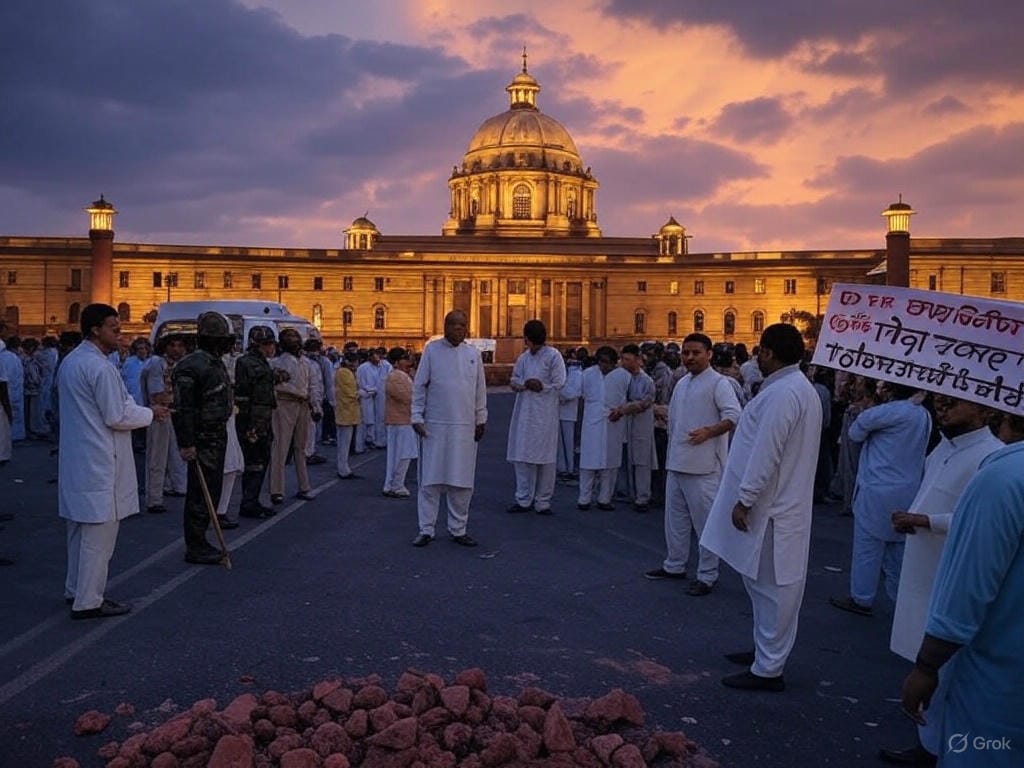April 5, 2025
It’s official: the Waqf (Amendment) Bill 2025 is now law. After two marathon days of fiery debates stretching past midnight, India’s Parliament gave it the green light early Friday, April 4, with the Rajya Sabha sealing the deal at 128-95 after the Lok Sabha’s 288-232 nod. As of today, April 5, 2025, the nation’s buzzing—some are cheering, others are protesting, and a few are already knocking on the Supreme Court’s door. So, what’s this bill all about, why’s it causing such a ruckus, and what’s next? Let’s break it down.
A Historic Win for Modi’s Vision—or a Constitutional Crisis?
Prime Minister Narendra Modi didn’t hold back his excitement, calling the bill’s passage a “watershed moment” for socio-economic justice and transparency. Home Minister Amit Shah echoed that vibe, declaring it the “end of an era of injustice and corruption” in Waqf property management. The government’s pitch? This isn’t about meddling with Muslim rights—it’s about cleaning up a messy system. Think less land-grabbing loopholes and more accountability, with measures like cutting mandatory Waqf contributions from 7% to 5% and mandating audits for big earners.
But not everyone’s buying it. Congress MP Mohammed Jawed and AIMIM chief Asaduddin Owaisi have already filed Supreme Court pleas, arguing the bill’s a “brazen assault” on the Constitution and Muslim autonomy. Sonia Gandhi doubled down, accusing the BJP of bulldozing it through Parliament to keep society polarized. From Kolkata to Ahmedabad, streets erupted in protests Friday after prayers, with Muslim groups and even Sikh leaders from the Akal Takht joining hands to call it a “threat to minority rights.”
What’s Changing with the Waqf Bill 2025?
So, what’s actually in this thing? The Waqf (Amendment) Bill 2025 tweaks the 1995 Waqf Act to, in the government’s words, “streamline” how Waqf properties—lands and assets dedicated for Muslim charitable purposes—are run. Here’s the gist:
- No More “Waqf by User”: That old trick of claiming land as Waqf just because it’s used for prayers? Gone. Supporters say this stops random grabs; critics fear it limits community flexibility.
- Non-Muslims on Boards: Waqf Boards now have to include non-Muslims, a move Shah says makes them “secular” but still Muslim-majority. Opponents see it as state overreach.
- High Court Appeals: Disputes can now go straight to higher courts, bypassing slower local channels.
- Transparency Push: Audits for Waqf outfits earning over ₹1 lakh and better coordination with local authorities are in the mix.
The bill’s journey wasn’t smooth—12 hours of chaos in the Lok Sabha, a 13-hour Rajya Sabha slugfest, and a Joint Parliamentary Committee (JPC) that adopted 14 amendments amid opposition outcry. Minority Affairs Minister Kiren Rijiju insists it’s all above board, born from “detailed consultation.” Still, dissenting voices like Congress’s Jairam Ramesh claim their inputs got ignored—or worse, censored.
Political Fallout: Allies Crack, Opposition Rallies
This isn’t just a policy shift—it’s a political earthquake. Nitish Kumar’s JDU is bleeding leaders, with five quitting over the party’s “yes” vote, including Nadeem Akhtar, who called it a “black law.” The BJD’s flip-flop—allowing a conscience vote after opposing it—has Prasanna Acharya asking who’s calling the shots. Even Shiv Sena (UBT) MPs were reportedly strong-armed by Uddhav Thackeray to vote “no,” per Sanjay Nirupam.
Meanwhile, the opposition’s gearing up for war. Congress vows a Supreme Court challenge “very soon,” with Abhishek Manu Singhvi hinting the judiciary might slap an “unconstitutional” label on it. Mamata Banerjee’s blasting it from Kolkata, promising to shield West Bengal’s Muslims from losing land. And in a rare twist, Sikh and Muslim leaders are uniting, with the SGPC branding it a “direct interference” in minority affairs.
The Street vs. The State: Protests and Promises
Friday’s scenes were raw—thousands hit Kolkata’s streets, banners waving in Ahmedabad, and chants echoing in Chennai. “It’s about our rights,” one protester told me (well, figuratively—I’m piecing this from the noise online). The fear? That centralizing Waqf control hands too much power to a government accused of divisive politics. The BJP fires back: this is reform, not retribution. Shah’s even met with poor and Pasmanda Muslims who, he says, begged for this change to “bring them into the mainstream.”
Bihar Governor Arif Mohammad Khan’s on board too, calling it a step to ensure Waqf income serves charity, not corruption. But Hayao Miyazaki—sorry, wrong story—let’s say the dissenters aren’t convinced. The Delhi Waqf Board’s scrambling to launch a website to explain its work, a sign the heat’s on.
What’s Next for the Waqf Bill 2025?
Here’s where it gets dicey. Legally, it’s Supreme Court time—Owaisi and Jawed’s pleas could freeze or flip it. Politically, it’s fuel for the BJP’s critics ahead of state polls, especially in Bihar, where JDU’s rift might cost Nitish dearly. On the ground, protests could swell if Muslim groups feel squeezed. And if the courts strike it down? Modi’s “historic day” might turn into a historic headache.
For now, the Waqf Bill 2025’s a lightning rod—celebrated by some as a fix for a broken system, cursed by others as a power grab dressed up as reform. One thing’s clear: India’s talking, and it’s not shutting up anytime soon. What do you think—justice or overreach? Drop your take below.
